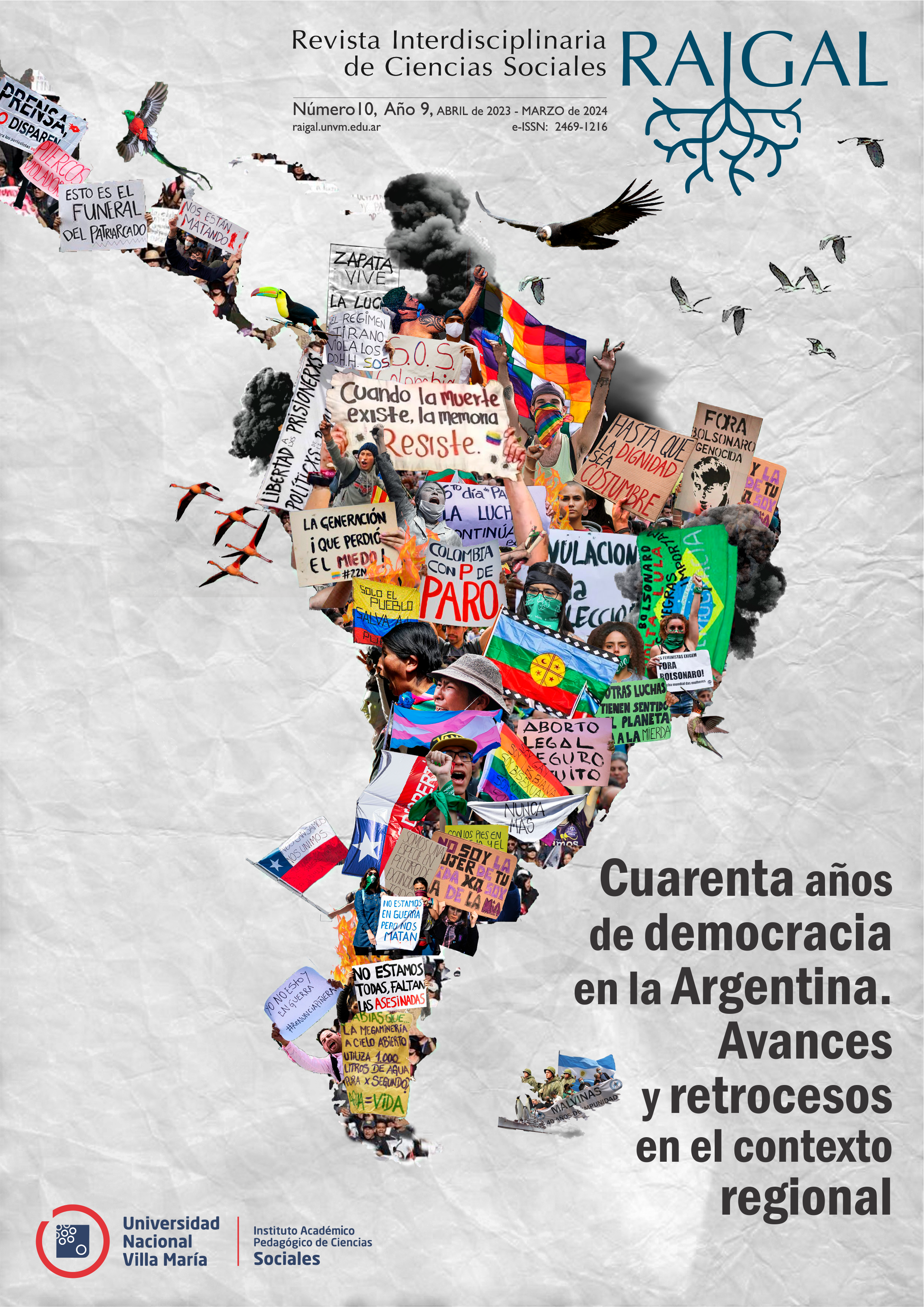Digitalization, State of Exception and the disappearance of what we have in common
Abstract
Ubiquitous digitalization redefines the patterns that guide the production and reproduction of power dynamics and wealth concentration. Millions of people, using unprecedented computing resources, recreate networked sociability mediated by algorithms, digital sociability, which imposes its own political and cultural references. In this context, algorithmic governmentality emerges that articulates and re-signifies life. Because of its impact on the very foundations of the human condition, this techno-social matrix enables the emergence of a permanent state of exception and a new extreme individual ethos, which weakens the mechanisms of social mediation inherited from liberal modernity and highlights the impossibility of constructing what we have in common, a necessary condition for the basic consensuses that make democracy possible.
Keywords:
digitalization, state of exception, algorithm, community, prediction, control, democracyLicense
Copyright (c) 2024 Enzo Girardi

This work is licensed under a Creative Commons Attribution 4.0 International License.
Downloads
References
ACEMOGLU, D. (2022). The End of Real Social Networks. 7/11/2022. Project Syndicate. https://www.project-syndicate.org/commentary/social-media-destroying-human-communication-by-daron-acemoglu-2022-09
AGAMBEN, G. (2004). Estado de Excepción. Homo sacer II. Adriana Hidalgo Editora.
ARIZMENDI, L. (2014): Capitalismo necropolítico y Ayotzinapa, www.rebelión.org. https://rebelion.org/capitalismo-necropolitico-y-ayotzinapa/
ARIZMENDI, L. (2019): Entrevista personal, realizada en Ciudad de México el 20 y 22 de octubre.
ARIZMENDI, L. (2018) “Tendencia neoautoritaria y dinámica dictatorial en América Latina”, pp. 15-48, en Arizmendi, L. y Beinstein, J. Tiempos de peligro: Estado de excepción y guerra mundial. Plaza y Valdez.
ARIZMENDI ROSALES, L., & Ramírez Siles, V. (2021). Tendencia a Estado de excepción planetario y crisis global del siglo XXI. Estudios Latinoamericanos, 47–67. https://doi.org/10.22201/fcpys.24484946e.2021.47-48.83334
BARICCO, A. (2018). The Game. Anagrana.
BENJAMIN, W. (1973). Sobre el concepto de la historia. Madrid: Taurus.
BERARDI, F. (2018). Fenomenología del fin. Buenos Aires: Caja Negra.
BUTLER, J. (2004). Vida precaria. El poder del duelo y la violencia. Buenos Aires: Paidós.
BRIDLE, J. (2/2/2019). The Age of Surveillance Capitalism by Shoshana Zuboff review – We Are the pawns. The Guardian. Recuperado de https://www.theguardian.com/books/2019/feb/02/age-of-surveillance-capitalism-shoshana-zuboff-review
CADWALLADR, C. (2016, 4 de diciembre). Google, democracy and the truth about internet search. The Guardian. Recuperado de https://www.theguardian.com/technology/2016/dec/04/google-democracy-truth-internet-search-facebook
CASTELLS, M. (2010). Comunicación y poder. Madrid: Editorial Alliance.
COHN, N. (2023, 20 de septiembre). Pew Research Center. The crisis is issue polling, and what we´re doing about it. The New York Times. Recuperado de https://www.nytimes.com/2023/11/20/upshot/polling-elections-issues-2024.html
CRAWFORD, K. (2021). Atlas of AI. London: Yale University Press (digital edition).
DATA.AI (s.f.). The Evolution of Social Media Apps. Recuperado de https://www.data.ai/en/go/the-evolution-of-social-media-apps/
HAN, B-Ch. (2022). Infocracia: digitalización y crisis de la democracia. Madrid: Taurus (edición digital).
HAN, B-Ch. (2021). El móvil es un instrumento de dominación. El País. https://elpais.com/ideas/2021-10-10/byung-chul-han-el-movil-es-un-instrumento-de-dominacion-actua-como-un-rosario.html
HAN, B-Ch. (2014) En el enjambre. Barcelona: Herder.
HAN, B-Ch. (2014). Psicopolítica. Madrid: Taurus (edición digital).
HARARI, Y. (2023, 24 de marzo). You Can Have the Blue Pill or the Red Pill, and We’re Out of Blue Pills. The New York Times. Recuperado de https://www.nytimes.com/2023/03/24/opinion/yuval-harari-ai-chatgpt.html
HARARI, Y. (2018). 21 lecciones para el siglo XXI. Buenos Aires: Debate (edición digital).
GOLDSTEIN J. & SASTRY G. (2023, 4 de agosto). La próxima era de la propaganda impulsada por IA. 2023. Democracia Siglo XXI. Recuperado de https://teodulolopezmelendez.wordpress.com/2023/04/08/la-proxima-era-de-la-propaganda-impulsada-por-ia/
KREPS, S., & KRINER, D. L. (2023). The potential impact of emerging technologies on democratic representation: Evidence from a field experiment. New Media & Society. Recuperado de https://doi.org/10.1177/14614448231160526
LÉVY, P (2021, 27 de junio): Aunque muchos no lo crean, ya éramos muy malos antes de que existiera internet. El País. Recuperado de https://elpais.com/eps/2021-06-27/pierre-levy-aunque-muchos-no-lo-crean-ya-eramos-muy-malos-antes-de-que-existiera-internet.html
LYON, D. (2010). Surveillance, Power, and Everyday Life. In: Kalantzis-Cope, P., Gherab-Martín, K. (eds). Emerging Digital Spaces in Contemporary Society. Palgrave Macmillan. https://doi.org/10.1057/9780230299047_18
LYON, D. (2017). Surveillance Culture: Engagement, Exposure, and Ethics in Digital Modernity. International Journal of Communication 11, pp. 824-842.
LÖWY, M. (2005). Walter Benjamin. Aviso de incendio, Buenos Aires: Fondo de Cultura Económica.
MBEMBE, J. A. (2011). Necropolítica. Madrid: Melusina.
MBEMBE, J. A. (2016), Crítica de la razón negra. Barcelona: Futuro Anterior Ediciones.
OLMO y ROMERO, J. (9/4/2019). Desinformación: concepto y perspectivas. Real Instituto Elcano. Recuperado de https://www.realinstitutoelcano.org/analisis/desinformacion-concepto-y-perspectivas/
PARISER, E. (2011). The Filter Bubble: What The Internet Is Hiding from You. London: Viking.
RAMÍREZ, M. (2023, 10 de enero). Patricia Campos Mello, periodista: “El asalto de Brasilia se planeó en grupos públicos de WhatsApp y Telegram, ¿por qué los servicios de inteligencia no hicieron nada?”. El diario.es. Recuperado de https://www.eldiario.es/internacional/patricia-campos-mello-periodista-asalto-brasilia-planeo-grupos-publicos-whatsapp-telegram-servicios-inteligencia-no-hicieron_128_9855590.html
RODRÍGUEZ, P. (junio de 2018). Gubernamentalidad algorítmica. Revista Barda. Año 4, número 6. Recuperado de https://www.cefc.org.ar/assets/files/barda-6.pdf
ROUVROY, A. & BERNS, T. (2016). “Gubernamentalidad algorítmica y perspectivas de emancipación. ¿La disparidad como condición de individuación a través de la relación?”. En Adenda filosófica, nro.1. Santiago de Chile, Doble Ciencia.
SADIN, E. (2022). La era del individuo tirano. Buenos Aires: Caja Negra
SADIN, E. (2020). La inteligencia artificial o el desafío del siglo. Buenos Aires: Caja Negra.
SADIN, E. (2018). La siliconización del mundo. Buenos Aires: Caja Negra.
SADIN, E. (2017). La humanidad aumentada. La administración digital del mundo. Buenos Aires: Caja Negra.
SMIALEK J. & TANKERSLEY J. (2023, 17 de noviembre). Want to Know What’s Bedeviling Biden? TikTok Economics May Hold Clues. The New York Times. Recuperado de https://www.nytimes.com/2023/11/17/business/economy/tiktok-biden-economy.html
SCHMITT, C. (2004). “Teología política I. Cuatro capítulos sobre la teoría de la soberanía”, en H. Aguilar, Carl Schmitt, teólogo de la política. México: Fondo de Cultura Económica.
TUFEKCI, Z. (2018). How social media took us from Tahrir Square to Donald Trump. MIT Technology Review. Recuperado de https://www.technologyreview.com/2018/08/14/240325/how-social-media-took-us-from-tahrir-square-to-donald-trump/
TUFEKCI, Z. (2017). Twitter and tear gas. Yale University Press.
VOSOUGHI, S., ROY, D., & ARAL, S. (2018). The spread of true and false news online. Science. https://doi.org/aap9559
ZUBOFF, S. (2023). Vivimos una distopia accidental. Ethic. https://ethic.es/2023/02/vivimos-en-una-distopia-accidental/
ZUBOFF, S. (2020). La era del capitalismo de la vigilancia. Buenos Aires: Paidós.
ZUBOFF, S. (2016). The Secrets of Surveillance Capitalism. Recuperado de
ZUBOFF, S. (2015). Big Other: Surveillance Capitalism and the Prospects of an Information Civilization. Journal of Information Technology & Politics. Zuboff, 2015: 75-98.






 We are indexed ...
We are indexed ...





